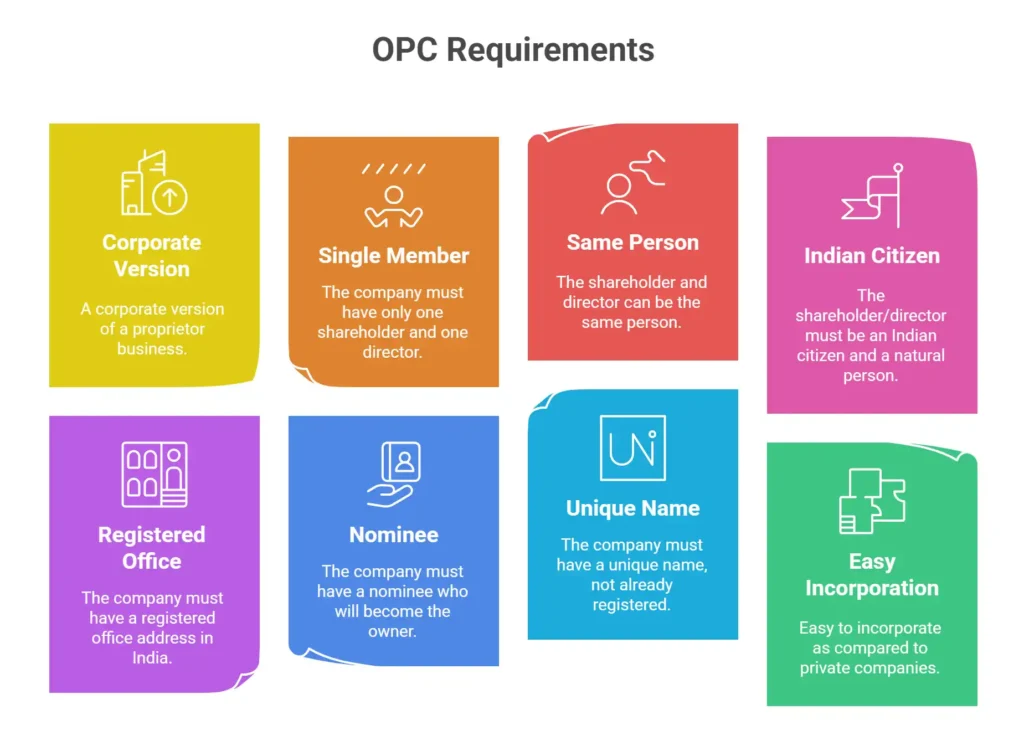One Person Company (OPC) in India is a new type of business structure where a single person can incorporate a company and become its sole director and shareholder.
OPC was introduced in India through the Companies Act, 2013, to provide a simpler and more flexible business structure for entrepreneurs who wish to start a business on their own. OPC is a hybrid form of a sole proprietorship, and OPC Registration provides the benefits of limited liability and a separate legal entity to the owner, which is not available in a sole proprietorship. At the same time, it is simpler to set up and maintain compared to a private or public limited company, as it requires only one director and shareholder.
An OPC registration in India requires having a nominee director and shareholder who will take over the management of the company in case the sole director is incapacitated or passes away. The nominee director has no rights or powers over the company unless the sole director becomes incapable of running the business.
Key Features of OPC in India

- This is a corporate version of a proprietor business.
- The company must have only one shareholder and one director.
- The shareholder and director can be the same person.
- The shareholder/director must be an Indian citizen and a natural person.
- The company must have a registered office address in India.
- The company must have a nominee who will become the owner of the company in case of the death or incapacity of the original owner.
- The company must have a unique name, which is not already registered with the Registrar of Companies (ROC).
- Easy to incorporate as compared to private companies.
Process of OPC Registration
The process of OPC registration is similar to company incorporation because it involves obtaining a Digital Signature Certificate (DSC), Director Identification Number (DIN), and filing the necessary documents with the ROC. After registration, an OPC must comply with various regulatory and compliance requirements, such as filing annual returns and maintaining proper accounting records.
Which Type of Business is Suitable for OPC in India
One Person Company registration is suitable for small businesses that are owned and managed by a single person. OPC is a suitable option for entrepreneurs who want to operate as a sole proprietor, but also want to have limited liability protection. Under the OPC structure, a single person can form a company by being both the director and shareholder of the company. The liability of the owner is limited to the extent of their shareholding in the company, and the company is treated as a separate legal entity distinct from its owner. This means that the owner’s personal assets are protected in case the company faces any legal or financial liabilities.
One of the key advantages of OPC is that it provides a formal and recognized legal structure to small businesses run by single entrepreneurs. This structure can help them to establish credibility and trust with their clients, customers, and vendors. OPC can also help the owner to raise capital, as it can issue equity shares to investors. Another advantage of OPC is that it is easier to manage compared to a partnership or a private limited company. As there is only one owner, decision-making is quicker, and there is less bureaucracy involved in running the business. The owner has complete control over the company and can make decisions without consulting other shareholders or partners.
OPC Vs. LLP Analysis
This is extremely important to analyze OPC vs. LLP, as One Person Company (OPC) and Limited Liability Partnership (LLP) are two different types of business structures in India. While both offer limited liability protection, there are few key differences between these structures that can influence the choice of business structure for an entrepreneur.
- Number of Owners: A single owner can start a business as an OPC; however, an LLP requires at least two partners.
- Compliance: OPC has more compliance requirements compared to LLP, such as annual filings, maintenance of books of accounts, audit requirements, etc.
- Taxation: OPC is considered a separate legal entity, and the income is taxed at the corporate tax rate. LLP is taxed as a partnership, and the income is taxed at the individual tax rate of the partners.
- Management: In OPC, the owner has complete control over the company, and there is no requirement for a board of directors. In an LLP, the partners have equal rights and can participate in the management of the business.
- Liability Protection: Both OPC and LLP offer limited liability protection, but the liability of the partners in LLP is limited to the extent of their contribution to the business, while in OPC, the liability of the owner is limited to the extent of their shareholding in the company.
Conclusion
In Conclusion, the choice of the business structure depends on the specific needs and objectives of the entrepreneur. OPC is suitable for a single owner who wants complete control over the business and prefers a simpler compliance regime. On the other hand, LLP is suitable for businesses that require more than one owner and want to have a more democratic management structure.










